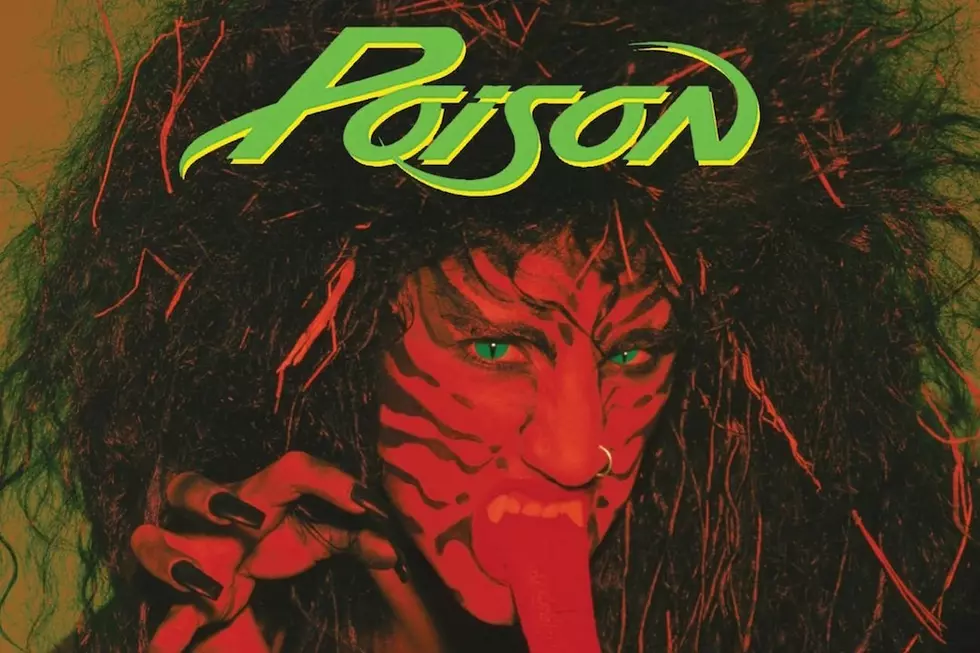
30 Years Ago: Poison Get a Bit Serious With ‘Flesh and Blood’
Poison didn't make it to the top by recording serious music. But every successful act needs a chance to show its darker side once in awhile, and after scoring back-to-back multi-platinum LPs, they set out to prove they were more than just a few pretty faces. The results arrived on June 21, 1990, in the form of the band's third LP, Flesh & Blood,
The 14-track collection included plenty of the sex-obsessed glam metal they'd become known for while also making room for a handful of songs that dealt with darker themes. As drummer Rikki Rockett pointed out in an interview prior to the record's release, the band's broadened palette was a by-product of their intense touring schedule in the years since scoring a hit with their 1986 debut album, Look What the Cat Dragged In.
"Life-type things," suggested Rockett when asked what sort of topics were inspiring the band in the months leading up to the new LP. "We spent 14 months supporting our first album and we're going into our 10th month on the second one, so we really do live on the road.
And when you do that, you experience so many things that you wouldn't just sitting around in L.A. When you're in a different city every day, you realize all kinds of things: how people live, their attitudes, their differences, what's important to them. And it makes for a good record when you draw on that many experiences."
While Flesh & Blood may have represented an evolution of sorts, it definitely wasn't a total break with the hedonism-fueled image that Poison had always perpetuated — as evidenced by the set's leadoff single, "Unskinny Bop," a song so proudly single-minded that its title didn't even mean anything. But as far as singer Bret Michaels was concerned, critics who knocked the band for being overly simplistic were guilty of ignoring the depth they'd already displayed on tracks like the 1988 acoustic hit "Every Rose Has Its Thorn."
"Everybody dumps on Poison, like we knew we were going to be famous from day one. They overlook the fact that there were no guarantees when we started out," Michaels told the Chicago Tribune. "A lot of these critics also overlook the fact that there were no acoustic ballads on Top 40 radio before 'Every Rose' came out. I'm really proud of that song. It opened up the door for a lot of people."
Whether that's strictly true is debatable, but there was absolutely no denying the demand for Flesh & Blood, which peaked at No. 2 on Billboard's Top 200 Albums chart while going triple platinum and spinning off four Top 40 hits: the No. 3 "Unskinny Bop," the pensive acoustic ballad "Something to Believe In," which hit No. 4, as well as "Ride the Wind" (No. 38) and "Life Goes On" (No. 35).
Watch the Video for 'Something to Believe In'
Asked to explain the strong sales for Flesh & Blood during a soft year for rock record sales, Michaels admitted, "It's a phenomenon I don't really understand. I think people are ready for a revival of rock, and our music is about the most honest rock 'n' roll you'll find. We've been influenced by a lot of different bands: Led Zeppelin, Van Halen, Aerosmith. Yet while we've crossed a lot of musical paths, we never really jumped on any one thing."
Poison's path was about to hit something of a dead end. Although Flesh & Blood was an inarguable triumph for the band, more turbulent times were just around the corner: By 1993, guitarist C.C. DeVille was out of the lineup, and a massive influx of younger, grittier bands at rock radio elbowed their next studio album, Native Tongue, out of the Top 10. The rest of the decade found the band struggling with label difficulties and lost momentum, and although they've since reunited with DeVille, recent years have seen the members openly struggling with their lack of activity.
For Rockett, Flesh & Blood still represents the best of what Poison had to offer in their early years.
"We had reached our apex with C.C. on that record. If he was straight and focused, we could have done another great album with him. But, the way things were going, it wasn't going to happen," he told JAM! during a 2014 interview. "After that tour, there was no way the four of us could make another record together. If by some miracle we had gone into the studio and made an album, it would have not been released."
See the Top 100 Albums of the '80s
More From Ultimate Classic Rock









